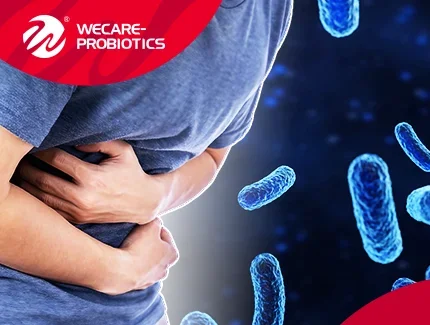Industry Insights
Probiotic Agent for Ethanol Degradation and Its Applications
Patent Information
Application Number: 202410218021.4
Publication Number: CN 117778279 A
Publication Date: 2024.03.29
Application Date: 2024.02.28
Applicants: Wecare Probiotics Co., Ltd.
Inventors: Fang Shuguang, Dong Yao, Shao Yawen, Qian Limin
Abstract
The invention relates to a probiotic agent for degrading ethanol, including Lacticaseibacillus rhamnosus LRa66 and Lactiplantibacillus plantarum Lp90. These strains work synergistically to enhance ethanol degradation and alleviate alcohol-induced liver damage. The probiotic agent offers a new strategy for the prevention, relief, or treatment of alcoholic liver damage.

Claims
1. Probiotic Composition: Includes Lacticaseibacillus rhamnosus LRa66 (CGMCC No.24282) and Lactiplantibacillus plantarum Lp90 (CGMCC No.10453).
2. Probiotic Ratio: The viable cell ratio between LRa66 and Lp90 ranges from 1:10 to 10:1.
3. Viable Cell Count: Total viable cells not less than 1×10^9 CFU/mL or 1×10^9 CFU/g.
4. Formulations: Freeze-dried powder, capsules, tablets, or granules.
5. Protective Agents: Includes additives like skim milk, sucrose, lactose, trehalose, dextran, gelatin, dextrin, arabic gum, sodium alginate, polyvinylpyrrolidone, sorbitol, or xylitol.
6. Auxiliary Additives: Includes inulin, fructo-oligosaccharides, xylo-oligosaccharides, galacto-oligosaccharides, isomalto-oligosaccharides, soybean oligosaccharides, spirulina, chlorella, cloud mushroom polysaccharides, raffinose, polydextrose, α-lactalbumin, or lactoferrin.
7. Applications: Prevention, relief, or treatment of alcoholic liver damage.
Technical Field
This invention belongs to the field of probiotics, specifically for the degradation of ethanol and applications in preventing or treating alcoholic liver damage.
Background
Alcohol dehydrogenase (ADH) and aldehyde dehydrogenase (ALDH) in the liver oxidize alcohol into acetaldehyde, a carcinogen, which is further converted into non-toxic acetic acid. Excessive alcohol consumption disrupts this process, leading to liver damage. Existing treatments for alcohol dependence have limitations and side effects. Probiotic supplements expressing ADH and ALDH are proposed as a safer alternative for protecting against alcohol-induced liver damage.
Detailed Description
Probiotic Strains and Their Interaction
Lacticaseibacillus rhamnosus LRa66 and Lactiplantibacillus plantarum Lp90: Combined in specific ratios to enhance ethanol degradation and protect against liver damage more effectively than individual strains.
Viable Cell Count: Ensuring a high viable cell count enhances the efficacy of the probiotic agent.
Formulations: Freeze-dried powder and other formulations ensure the stability and ease of consumption.
Experimental Results
Ethanol Degradation: The combined use of LRa66 and Lp90 showed superior ethanol degradation capabilities compared to individual strains.
Animal Studies: Mice treated with the probiotic combination had extended intoxication latency, reduced blood ethanol levels, improved liver enzyme levels, and reduced oxidative stress markers.

Benefits
The probiotic agent provides a new method for preventing and treating alcoholic liver damage, leveraging the synergistic effects of LRa66 and Lp90 strains. The formulation is safe, effective, and free from dependency issues commonly associated with pharmacological treatments.









 Leave a Message
Leave a Message Email
Email Linkedin
Linkedin